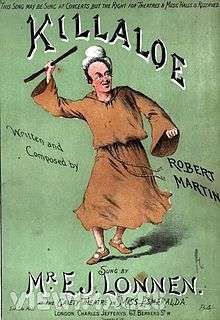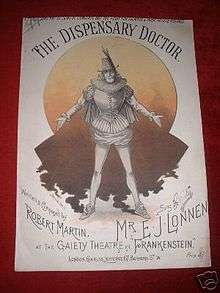E. J. Lonnen
Edwin Jesse "E. J." Lonnen (1860 – 31 October 1901)[1] was an English actor, comedian and singer known for his performances in musical burlesques, operettas and musical comedies, particularly at the Gaiety Theatre, London at the end of the Victorian era.


Lonnen began acting as a child in pantomime and other theatre in the British provinces. He made his London debut in 1885 and appeared in several of the famous Gaiety burlesques from 1887 to 1891. He starred in such other major works as Little Christopher Columbus (1893), Baron Golosh (1895) and The Messenger Boy (1900) before dying at the age of 41.
Biography
Lonnen was born in Kingston upon Hull, Yorkshire[2] into a theatrical family. His father William Rooles Lonnen (1833–1890)[3] was an actor-manager, well known in the provinces under his stage name, Champion.[4] Lonnen appeared in his father's productions from an early age. "I have a distinct recollection of playing a speaking part in a pantomime when I was five years old. I have been the baby in East Lynne; Prince Arthur – in fact I have played the whole round of juvenile parts."[4] As a teenager, Lonnen acted for Harry Wright's "booth" company of travelling players, and shortly before he was 20, he was engaged to appear with Barry Sullivan, and then with Edward Terry playing Tootles in Weak Woman and the Dougal Creature in Robbing Roy.[4] He made a hit in a Liverpool pantomime with Frank Emery, who engaged him for his burlesque company for a provincial tour that brought him to wider attention.[4]
Lonnen made his London debut as Tancred in Falka at the Avenue Theatre in 1885[4] and subsequently starred in a series of successful musical burlesques at the Gaiety Theatre in London, including Monte Cristo Jr. as De Villefort (1886), Miss Esmeralda as Frollo (1887, in which he sang Killaloe, perhaps his most popular song),[5] Frankenstein, or The Vampire's Victim (1887), Faust up to date as Mephistopheles (1888), Carmen up to Data as José (1890) and Cinder Ellen up too Late as Prince Belgravia (1891). After this, he starred in another burlesque hit, Little Christopher Columbus, as O'hoolegan (1893 at the Lyric Theatre), in the title role of the operetta Baron Golosh (1895 at the Trafalgar Theatre), and in La Béarnaise as Girafo (1896 at the Prince of Wales's Theatre). In the burlesque Monte Cristo Jr. at the Gaiety, he sang the song "Ballyhooly". He also starred in the musical comedy hit The Messenger Boy as Cosmos Bey (1900 at the Gaiety).[6]
Lonnen married Emily Inman, a dancer. They had a daughter, actress Jessie Lonnen,[7] who performed with George Edwardes's company in England[8] and the J. C. Williamson company in Australia. His son, Lieut. Edwin John Leslie Lonnen,[9] a pilot with the RFC, was killed in action in World War I on 16 August 1916 at the age of 27.[10][11] Lonnen died of tuberculosis at the Sanatorium, Hailey, Ipsden at the age of 41.[12] He is buried at the Norwood Cemetery.[13]
Notes
- "Edwin Jesse ('E.J.') Lonnen as a policeman", National Portrait Gallery, accessed 27 August 2012
- General Register Office, England and Wales Civil Registration Indexes, volume 9d, p. 217
- General Register Office, England and Wales Civil Registration Indexes, volume 1d, p. 217
- "A Chat with E. J. Lonnen", The Era, 25 November 1893, p. 11
- The Times, 2 November 1901, p. 8
- Adams, pp. 113, 127, 255, 291, 352, 503 and 547
- London Metropolitan Archives, England, Marriages and Banns (1754–1921), Saint Matthew's Church, Brixton, Register of marriages, p. 19
- The Manchester Guardian 27 December 1919, p. 1
- London Metropolitan Archives, Brixton Register of Baptisms, p. 77
- Suffolk Regiment personal announcements, 24 August 1916
- "UK Soldiers Died in the Great War 1914–1918", British and Irish Military Databases, The Naval and Military Press Ltd.
- General Register Office, England & Wales, FreeBMD Death Index: 1837–1915, volume 3a, p. 495
- London Metropolitan Archives, Church of England Parish Register of Burials (1813–1906), Norwood Cemetery Transcript of Burials, (January 1901 – December 1903), p. 2645
References
- Adams, William Davenport. A Dictionary of the Drama, London: Chatto & Windus (1904)